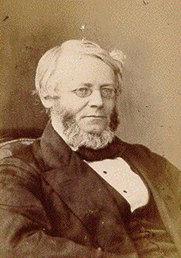Dr Thomas Laycock
1812-1876
Is best known for his work in neurophysiology. He is particularly celebrated for his work on reflex actions of the brain, a reflex being an unconscious reaction to stimuli operating on the nervous system. He demonstrated that the brain, though an organ of consciousness, was also subject to the laws of reflex action and in this respect no different from other ganglia. However, the physiology of the nervous system had implications for mind and behaviour, and like other scientific developments, was difficult to reconcile with Christian theological belief. This involved controversial concepts relating to the physical basis of normal as well as abnormal behaviour: the nature of the will, consciousness, and the relationship between body, mind and spirit. Laycock was born in Wetherby on 10 August 1812. His father was a Wesleyan minister and as the family moved frequently to different postings round Yorkshire and Laycock went to Woodhouse Grove boarding school to avoid disruption to his education. In 1823 the external examiner was Patrick Bronte, the vicar of Haworth. In 1833 he went to University College, London, to study medicine and surgery. He enjoyed the lectures on comparative anatomy by Robert Grant, a freethinker who considered that physical and chemical forces alone were responsible for the origin and evolution of life. Laycock himself retained his Christian faith, but evidently found this stimulating. He gained his MD from Göttingen University on the basis of these papers on hysteria and became a practising physician in York, further strengthening his professional qualifications by becoming a licentiate of the Royal College of Physicians of London. In 1855 he was encouraged to apply for the chair of medicine at Edinburgh, and despite his wife’s reluctance to move accepted the post. He was made a Fellow of the Royal Society of Edinburgh in 1856, and in 1859 became Physician to the Queen in Scotland. Among his many interests, his work on the mind and brain established the teaching of psychiatry in Edinburgh. His influence on neurologist John Hughlings Jackson, and the psychiatrist James Crichton-Browne, led to the further development of medical psychology. Their influence in turn continues to the present day. Laycock seems to have been a rather irritable, confrontational personality and also a little paranoid about the class distinctions that put him at a professional disadvantage. He was of short stature and suffered from ill health. There was tuberculosis in his family; at least one child died of it, and Laycock himself suffered amputation of a leg in 1866, probably because of TB. His death on 21 September 1876 was almost certainly due to pulmonary TB.
